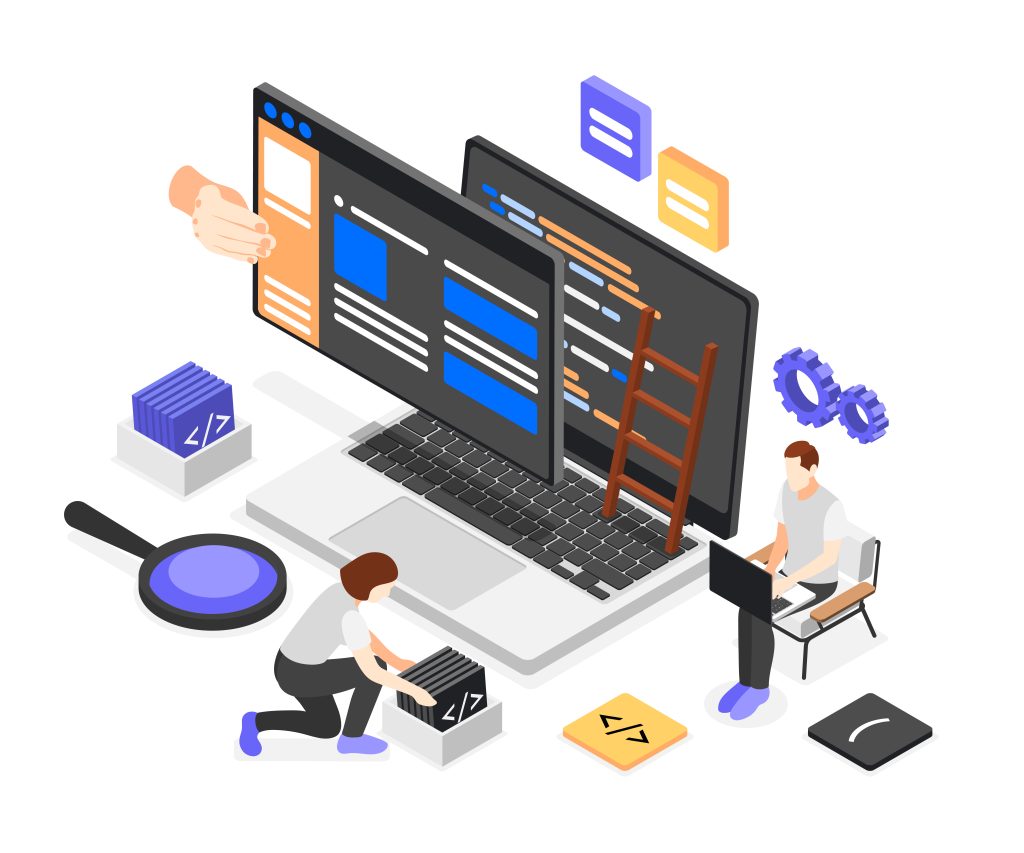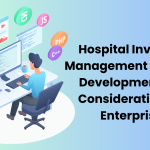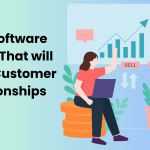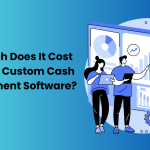Like most other industries, logistics is currently facing immense change. That’s because the world is heading towards digitalization. The technological advancement is shifting everything from traditional to digital approach, leading to a way of innovation and creativity. Understanding the situation, logistics businesses are also striving hard to stay competitive in the saturated market. For which, they need help from technology – such as updating their software.
Investing in a custom software development for your logistics business is a great alternative that logistics companies need to focus on. Custom logistics software fosters accuracy, security and efficiency and meets the operations needs of your business in a way that most off-the-shelf software cannot.
This article covers every minor detail related to why you should invest in a custom software development for your logistics business and how a custom logistics solution benefits your company. Let’s jump right into the in-depth details.
What is Logistics Software Development?
Logistics software development is the process of building digital solutions for automating, managing and optimizing logistics, warehouse and transportation-related tasks. Companies can choose to leverage custom logistics software or adapt ready-made logistics management systems depending upon their logistics needs.
Usually, companies always lookout for right solutions that cater to their business requirements and deliver effective and reliable logistics software. Bespoke logistics software helps entrepreneurs enhance their competitiveness in their industries and niches by optimizing their operations. Together, employers and employees can overcome many obstacles and become powerful players in the market.

1. Operational Issues Resulting in Increased Delivery Times
Logistics organizations require energy, resources and time to streamline workflows and deliver on time. If you’re confronting issues with streamlining operations, custom logistics software development helps you manage operational activities effectively and ultimately results in decreased delivery times.
Businesses can maximize productivity and streamline processes using automated solutions and custom logistics software development services. As a result, business owners will have more time to devote to strategic decision-making and customer service and less time to manual work. For example, you might develop an application that offers real-time delivery updates if you wanted to keep track of the status of a cargo. With this knowledge, your staff members can make proactive efforts to guarantee that the shipment arrives at its destination on schedule.
2. Real-Time Tracking for Improved Visibility
Tracking is a huge challenge for logistics businesses since the traditional logistics and supply chain management approach work manually and without any proper system. Custom logistics software specially designed for your business helps with an optimized tracking system in place. Tracking shipments in real-time, automating fleet operations and monitoring inventories – everything is possible with custom logistics software. Additionally, since customers can readily see and track real-time shipment information, there is no need for manual tracking. This results in enhancing productivity, improving transparency and building a trustworthy relationship with your customers.
3. Ensure Scalability & Flexibility
Scope of scalability can make or break a business in the long run. How well your business is prepared for upcoming changes ahead of time is what stands out among the competitors.
A standard, off-the-shelf logistics software may not always cater to the growing needs of your business. Hence, a packaged, tailor-made logistics solution is a preferred choice. Be it growing your fleet, introducing new services, or venturing into untapped markets, an explicitly designed software for your needs offer scalability and flexibility to your changing business objectives.
4. Smart Data Analytics & Reports To Cultivate Informed Insights
Effective data analysis and real-time reports are inevitable for logistics businesses. They help businesses make informed decisions and ensure that operations are run seamlessly.
Off-the-rack solutions are not designed to handle complex data, or you can say that they are created for generic tasks and do not perform critical data analysis. That’s where you need a custom-made logistics software.
With custom business software, you may create databases and customized reports that are specific to your requirements. Custom dashboards, data visualizations, and reporting tools are made available by tailoring these systems to enable the easy gathering, storing, and monitoring of your company’s significant data.
5. Operational & Maintenance Costs Savings
Building a custom logistics software from scratch can be costly, however, the number of benefits that it incur can outweigh the initial costs. By automating manual processes, tracking inventories, managing fleet operations, enhancing turnaround and delivery times etc can substantially reduce operational and maintenance costs.
Must-Have Features in a Cutting-Edge Custom Logistics Software
Until now, you have grasped the concept of choosing a custom logistics solution for your business. Enough of the hassle, right! Now we’ll save you from brainstorming and walk you through some of the notable features that your custom web or mobile logistics app must have.
- Real-time shipment tracking
- Fleet management
- Supply chain management
- Data analytics and reports
- Support & Community management
- Transportation management
- Third-party integrations
Creating a Custom Logistics Software: Step-By-Step Process
Every end result requires a systematic process. Similarly, developing a custom logistics management software hinges upon an essential step-by-step process. Let’s delve into the series of fundamental steps:
1. Idea Validation & Requirements Handling
The first step involves defining your business requirements and determining the comprehensive advantages / features of your logistics software. You should likely collaborate with all the stakeholders of your business from project managers, logistics managers and end-users to discuss their needs and pain points. During this phase, you should clearly check the feasibility of your app idea and map out necessary steps to facilitate the subsequent development process.
2. Designing Software Architecture & Developing a Customized Deployment Strategy
This is a phase where the custom design and development of your software take place. Define system components, modules, and existing components integration capabilities. It is also important to visualize UI and UX design elements of the software so that the user journey is a seamless one. Analyze your desired app features and choose a well-suited technology stack. Implement more modules to improve the software’s functioning based on your unique demands.
Furthermore, select deployment strategy as per your requirements and objectives. Out of on-premises deployment and cloud deployment, choose the one that matches your needs.
3. Testing Your Logistics Software
Testing can make or break your software development game. Rigorous testing is conducted before deployment to verify standards of scalability, reliability, performance and security. The development should actively look for potential bugs, issues and bottlenecks. Addressing these issues before time will make ways for a fully-functional and seamless software and enhancing ROI in the long run.
4. Support & Improvement
During this phase, the deployment process is closely managed and monitored. It entails putting in place support systems, user training programmes, and a feedback loop for ongoing development. This stage makes sure the custom logistics software is successfully deployed, integrated with your company’s systems, adopted by users, and continuously improved.

Final Thoughts
Logistics custom software offers a multitude of advantages over standard, ready-made software. They are now a need rather than a luxury for logistics companies hoping to prosper in today’s cutthroat market. You can simplify processes, improve tracking and visibility, grow efficiently, integrate with other systems, use data analytics, and ultimately reduce costs.
Custom software can help you stay ahead of the curve, provide your customers with the best service possible, and promote sustainable growth in the ever-changing logistics sector, regardless of the size of your company. Take a leap of faith and choose a customized approach to develop a fully-functional custom logistics software for your business.
If you are considering a logistics software development partner, Stackup Solutions can serve best in this regard. We have a proven record of delivering successful custom software development solutions in your dedicated time and budget. Contact Stackup Solutions today to discuss your logistics software development needs.
FAQs
1. Why should my logistics business invest in custom software development?
Investing in custom software development for your logistics business offers numerous benefits such as increased efficiency, accuracy, and security tailored specifically to your operational needs. It helps streamline processes, reduce delivery times, improve tracking and visibility, and ultimately, stay competitive in the evolving market.
2. How is custom logistics software different from off-the-shelf solutions?
Custom logistics software is specifically designed and developed to meet the unique requirements of your logistics operations. Unlike off-the-shelf solutions which offer generic functionalities, custom software can be tailored to integrate seamlessly with your existing systems, provide real-time tracking, and offer scalable solutions for future growth.
3. What is the cost of developing custom logistics software for your business?
The cost of developing a custom logistics software hinges upon various factors such as features, app complexity, tech stack, integration and customization requirements. It is impossible to quote an exact figure for the cost estimation. Contact us for the estimated cost quotation by discussing your project requirements.
4. How can I choose the right logistics software development partner for my business?
When choosing a logistics software development partner, consider factors such as their experience and expertise in developing custom solutions, their ability to understand your specific business requirements, their track record of successful projects, and their commitment to delivering solutions within your budget and timeline. Companies like Stackup Solutions offer tailored development services and can be a reliable partner for your logistics software needs.







